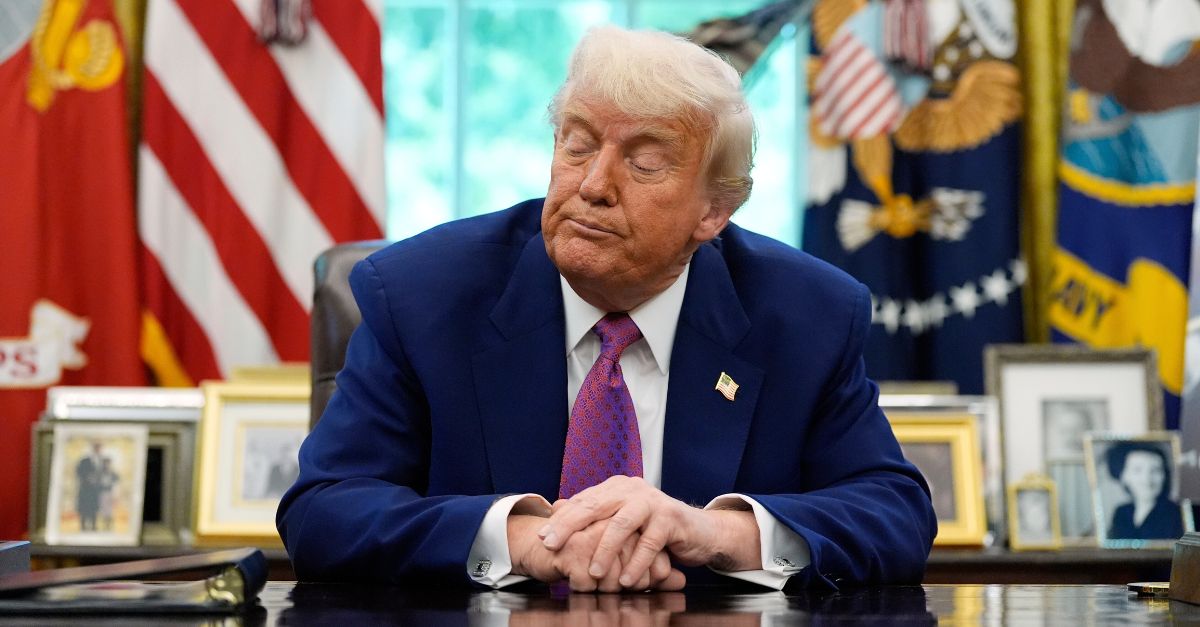
President Donald Trump pauses as he speaks in the Oval Office of the White House, Tuesday, May 20, 2025, in Washington (AP Photo/Alex Brandon).
The Trump administration on Wednesday asked a federal judge to keep information away from the press in the case of Kilmar Abrego Garcia, the Maryland man the government admittedly “wrongfully” deported to El Salvador in violation of court orders.
In a 16-page motion, Department of Justice attorneys opposed an unsealing request filed by several media outlets earlier this month.
“The Court placed highly sensitive judicial records under seal to preserve their sensitivity and prevent significant harm if they were to be disclosed,” the filing reads. “Intervenors now seek access to obtain and presumably disseminate these documents. Neither the First Amendment nor common law entitles them to do so.”
The dispute touches upon a long-running subcurrent in the Abrego Garcia case: for several weeks, beginning in late April, U.S. District Judge Paula Xinis has allowed the parties to file under seal.
The government, for its part, has been happily keeping certain information under wraps. But, while initially at least modestly supportive, Abrego Garcia’s attorneys and the court itself have grown increasingly skeptical of the need to sustain the regime of secrecy.
On May 6, a coalition of media groups led by Dow Jones, the company that publishes the Wall Street Journal, petitioned the court to intervene and asked the judge to publicize “certain court records” dating back to the first sealed filing — a joint submission — in the case.
“The eyes of the public and all three branches of government are on this lawsuit: in the weeks since it was filed, the case has already been before the U.S. Supreme Court and the Fourth Circuit (twice), the President has discussed it during a nationally televised interview and on social media, and members of Congress have traveled internationally to meet Plaintiff Kilmar Armando Abrego Garcia and investigate the conditions of his detention,” the media motion notes. “The case raises profound questions of separation of powers, civil liberties, and foreign relations.”
The coalition suggested a broad sphere of silence enabled by the court, even including notice of hearings in the high-profile case.
“[T]he parties began filing submissions in this matter under seal — seemingly without requesting or receiving permission from the Court to do so,” the media motion goes on. “First, the parties jointly filed a sealed request for a conference with the Court. Then, the government filed a sealed motion, and Plaintiffs filed a sealed response. Finally, last week, the government filed another sealed motion which was denied ‘[f]or the reasons stated on the record during today’s proceeding’ despite no hearing being noticed on the docket or appearing on the Court’s calendar.”
In their filing, the media outlets argued that the long-standing common-law presumption of access to court records should decide the issue.
Attorneys representing Abrego Garcia said they took no position on the request and would defer to whatever the court decided, but asked that some personally identifying information be redacted in the event anything was unsealed.
The Trump administration, on the other hand, rubbished the coalition’s unsealing request as “efforts to pry into highly sensitive matters” that lack any basis in the law or the U.S. Constitution.
“The default presumption of access is subject to a balancing test in which access may be denied if, as is the case here, a countervailing interest overcomes it,” the government’s motion reads. “As courts have consistently recognized, there is no more compelling or substantial interest the United States possesses than protection of national security and classified information.”
The DOJ goes on to argue that even “sensitive but non-classified information” should remain under lock and key because its release might “adversely affect the outcome of the case.”
To hear the government tell it, there is already enough “broad public access” to relevant information in the case through “publicly available briefs, hearings, and opinions, which are sufficient to inform the public how this case is decided.”
The press coalition also says the First Amendment further supports their efforts to gain access to the records, and argued such an analysis requires an even stronger showing by the government of a “compelling” interest to maintain the denial of access.
The Trump administration, for its part, says the media outlets have misapplied First Amendment precedent to the wrong kind of judicial records. They argue that presumption of access only controls documents like those filed in connection with “plea hearings and sentencing hearings in criminal cases” and “a summary judgment motion in a civil case.”
But even if the documents in question that the press were trying to unseal did qualify, the First Amendment analysis still would not swing in their favor, the government argues.
“Even if the Court considers the matter further, Intervenors are still not entitled to access the requested judicial records and documents because there is a compelling governmental interest — protecting national security and preventing the dissemination of sensitive information — in keeping sensitive information under seal,” the government’s motion argues.
The rub, of course, is that the details undergirding the national security argument will necessarily not be relayed in a public filing. So, the press coalition is not privy to the full scope of this argument.
“Intervenors do not have a First Amendment right to the requested judicial records and documents,” the government concludes. “And even if they did, the government’s interest in national security is compelling, and sealing that information is narrowly tailored to achieve that interest.”

